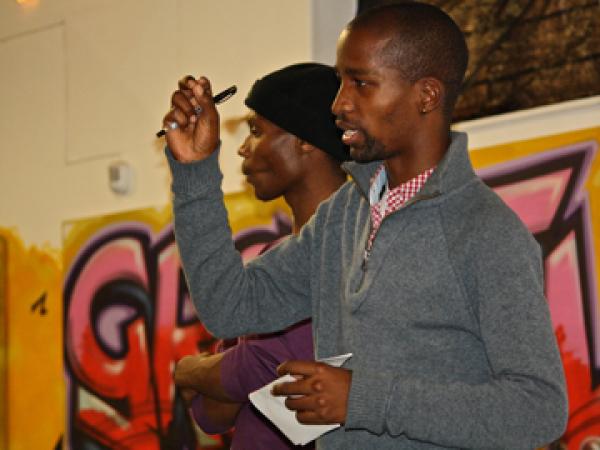Khayelitsha Film Festival a “great basis to grow from”

The second day of the first Khayelitsha film festival at the Khayelitsha’s Hubspace, fragrant with freshly popped corn, was attended by members of MOSAIC, Equal Education, Treatment Action Campaign, and Social Justice Coalition.
The makeshift movie theater was filled with T-shirts emblazoned with campaigns — ‘HIV Positive’ in bold black-and-white text, ‘Build the Future. Fix Our School’ , and in black and purple ‘MenCare+’.
Between film screenings there were discussions facilitated by Social Justice Coalition, in which the activist community debated the way forward.
The first film of the afternoon, a short documentary called A Place in this City, featured Abahlali baseMjondolo, a grassroots movement of shack dwellers near Durban. The film followed Abahlali’s mobilization against substandard living conditions and forcible evictions faced by residents of a community near Durban’s Foreman Road. It highlighted a lack of community consultation by the South African government in addressing both issues and called into question the legitimacy of a democracy that fails to include the poor.
One of Abahlali’s founding slogans, ‘Talk to us, not about us’, resonated well with the Khayelitsha audience in the discussion that followed the film. Yet viewers disagreed over the extent to which the government should be held responsible for the plight of the poor.
19-year-old Khayelitsha resident Unathi Mgele voiced disagreement with shack dwellers in the film who chose to sell or rent out government-supplied housing amid forced eviction, in spite of their commuting concerns. They were demanding too much from the government, she argued.
Another older audience member disagreed with Mgele, and said that given South Africa’s wealth of resources, government should be able to ensure its citizens a higher basic standard of living. Both sides were met with considerable applause.
A second film, the three-part documentary Africa is a Woman’s Name, followed three African women on remarkably distinct paths to female empowerment: a Zimbabwean domestic worker, a South African educator, and a Kenyan activist combating sexual violence. Though less polarizing than the first film, it too was met with a notable spread of reactions.
One viewer used the film as an opportunity to express concern about sexual violence brought to public attention amid recent allegations against a Khayelitsha pastor. Others drew upon the film to consider how gender roles are produced and reinforced from an early age by community members, dissecting such conventions as why certain colours are deemed “male” and others “female” colours.
Sthembile Dantile, a Junior Campaigns organizer for Equal Education, said that he was particularly struck by the Saturday morning film, Where do I Stand?, which focused on xenophobia in South Africa. To Dantile, the film highlighted an urgent need for a change in the South African mindset towards immigrants and refugees.
“We are celebrating foreigners from overseas while hating African foreigners. Why? We are one,” he said.
The festival’s only non-African, non-documentary film, Precious, screened on Sunday morning, elicited an emotional reaction from the audience, leaving many in tears as they recognized struggles present throughout the Khayelitsha community in Precious’s American tale.
Festival patrons agreed on the importance of having larger, more widespread, and more frequent events of its nature in the future. Dantile hoped for a Cape Town-wide festival, involving multiple townships and funding to transport viewers to a common arena.
Nishal Robb, Head of Campaigns for Equal Education, said the film festival was a tremendous success. “We’ve built a great basis to grow from,” he said.
Next: Mining town residents voice health concerns
Previous: The environmental legacy of mining on the Mpumalanga Highveld

This article is licensed under a Creative Commons Attribution-NoDerivatives 4.0 International License.


